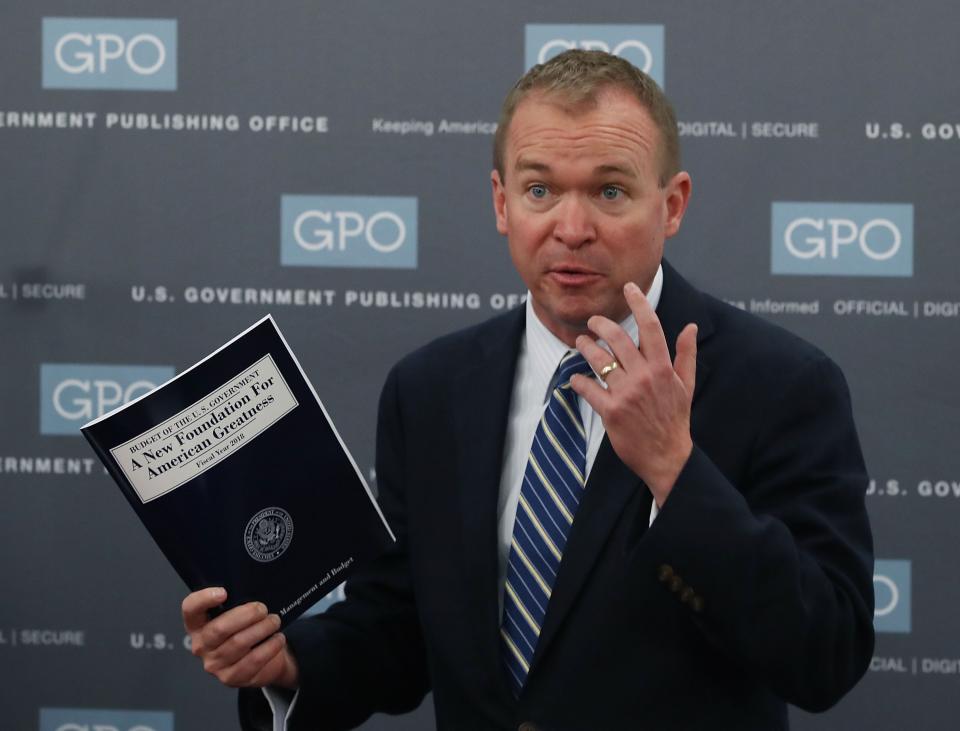The message of Trump’s budget: Get a job!
President Trump’s first official budget proposal relies on a lot more people working—whether they want to or not.
The $4.1 trillion federal budget Trump is sending to Capitol Hill aims to raise economic growth from the current weak level of around 2% to 3% or more. That will require more people working and generating economic output. “We need people to go back to work,” Trump’s budget director, Mick Mulvaney, told reporters on Monday. “If you’re on food stamps and you’re able-bodied, we need you to go back to work.”

Trump wants to start with people who want to work more, even if they don’t have a job. In addition to the 7 million Americans who are unemployed and looking for work, another 6.8 million are working part-time because they can’t find full-time work, or staying home because they don’t think there are any jobs to be had. “We want those folks to work, and we need those folks to work,” Mulvaney said. Since most of those people would welcome a decent-paying job, it’s not terribly controversial to try coaxing them back into the work force.
But Trump also wants to toughen the rules for some people getting federal benefits, as an incentive to force more people to get jobs. Mulvaney, for instance, pointed out that when President Obama took office in 2009, about 32 million Americans got federal food benefits known as SNAP. That rose to nearly 48 million in the aftermath of the recession, when unemployment was high. The unemployment rate is now lower than it was before the recession, yet the number of people receiving food stamps is still more than 42 million. “It raises a very valid question,” Mulvaney said. “Are there folks on SNAP who shouldn’t be?”
A work requirement
Trump’s budget would address that question by adding a work requirement to the SNAP program, requiring “able-bodied” recipients without children to prove they’re looking for a job. There would be similar efforts to force people receiving Social Security disability payments to look for work, if they’re able to. “We are no longer going to measure compassion by the number of people on those programs,” Mulvaney said. “We will measure it by the number of people we help get off of those programs and regain control of their own lives.”
Congress is certain to reject major portions of Trump’s budget, since even fiscally conservative Republicans tend to protect federal spending that benefits their states. Overall, Trump’s budget would boost spending on defense, border security, veterans’ benefits and certain alternatives to public education, while cutting spending on just about everything else. It would also incorporate the cuts in Medicaid contained in the Republican healthcare bill that passed the House a few weeks ago. And it would include Trump’s plan to cut taxes, although it doesn’t attach a dollar figure to that portion of the budget.
In addition to new work requirements, Trump would impose a new rule on families that claim the earned-income tax credit or the child-care tax credit. Under Trump’s budget, parents in such families would have to have a valid Social Security number, meaning they’d have to be able to prove they’re US citizens. That would prevent such aid from going to illegal immigrants, even if children in the family were born in the United States and had their own Social Security cards. Such measures have provoked criticism of Trump’s budget for being heartless, but Mulvaney said it’s heartless to ask American taxpayers with scarce resources to pay for benefits for non-Americans.
Congress must either pass a budget or come up with another funding mechanism by Oct. 1, when the government’s fiscal year begins. Trump’s most controversial proposals probably won’t be a part of it. Although the House passed a sweeping bill to unravel parts of Obama’s Affordable Care Act, the Senate seems much more reluctant to pass sharp cuts in Medicaid. A tax-reform bill was once considered possible for 2017 but has since been slowed by various Trump controversies. Changing the structure of safety-net programs such as SNAP and disability insurance would be controversial as well. That won’t stop Trump, of course.
Confidential tip line: rickjnewman@yahoo.com
Read more:
Rick Newman is the author of four books, including Rebounders: How Winners Pivot from Setback to Success. Follow him on Twitter: @rickjnewman

